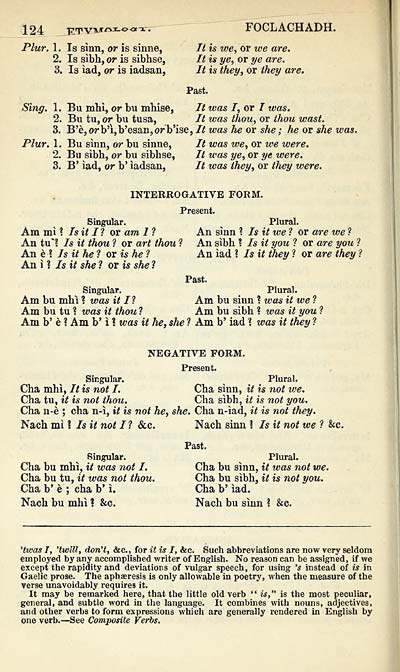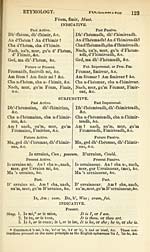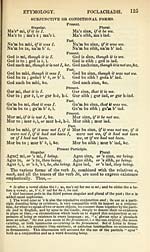Books and other items printed in Gaelic from 1841 to 1870 > Stéidhean a' Ghràmair Ghaëlig
(152) Page 124
Download files
Complete book:
Individual page:
Thumbnail gallery: Grid view | List view

124 FT VAT/XE^OfTTi
Plur. 1. Is sìnn, or is sinne,
2. Is sìbh, or is sibhse,
3. Is ìad, or is iadsan,
FOCLACHADH.
It is we, or we are.
It is ye, or ye are.
It is they, or they are.
Past.
Sing. 1. Bu mhì, or bu mhise, was I, or / was.
2. Bu tu, or bu tusa, It was thou, or thou wast.
3. B'è,orb ì,b'esan,orb'ise, was he or sAe; or she was.
Plur. 1. Bu sìnn, or bu sinne, It was we, or were.
2. Bu sìbh, or bu sibhse, li was ye, or ye were.
3. B' ìad, or b' ìadsan, was they, or were.
INTERROGATIVE FORM.
Present.
Singular. ^ Plural.
Am mì ? Isit I? or am 1 ? An sìnn 1 Zs i£ w<? ? or are we t
An tu"? Is it thou ? or art thou ? An sìbh ? Zs i£ #om ? or are yow i
An è ? Is itheì or is he ? An ìad ? Zs ? or are they
An ì ? Zs sAe ? or is sAe ?
Past.
Singular. Plural.
Am bu mhì ? was it I? Am bu sinn ? was it we ?
Am bu tu ? was it thou ? Am bu sibh ? was it you ?
Am b' è ? Am b' ì ? was it he, she ? Am b' iad ? was it they ?
NEGATIVE FORM.
Present.
Singular. ^ Plural.
Cha mhì, It is not I. Cha sìnn, it is not we.
Cha tu, it is not thou. Cha sìbh, it is not you.
Cha n-è ; cha n-ì, it is not he, she. Cha n-ìad, it is not they.
Nach mì ? Is it not I ? &c. Nach sinn ? Is it not we ? &c.
Singular.
Cha bu mhì, it was not I.
Cha bu tu, it was not thou.
Cha b' è ; cha b' ì.
Nach bu mhì ? &c.
Past.
Plural.
Cha bu sìnn, it was not we.
Cha bu sìbh, it is not you.
Cha b' ìad.
Nach bu sìnn ? &c.
'twas I, 'twill, don't, &c, for it is I, &c. Such abbreviations are now very seldora
employed by any accomplished writer of English. No reason can be assigned, if we
except the rapidity and deviations of vulgar speech, for using 's instead of is in
Gaelic prose. The aphaeresis is only allowable in poetry, when the measure of the
verse unavoidably requires it.
It may be remarked here, that the little old verb " is," is the most peculiar,
general, and subtle word in the language. It combines with nouns, adjectives,
and other verbs to form expressions whicli are generally rendered in English by
one verb.— See Composite Verbs.
Plur. 1. Is sìnn, or is sinne,
2. Is sìbh, or is sibhse,
3. Is ìad, or is iadsan,
FOCLACHADH.
It is we, or we are.
It is ye, or ye are.
It is they, or they are.
Past.
Sing. 1. Bu mhì, or bu mhise, was I, or / was.
2. Bu tu, or bu tusa, It was thou, or thou wast.
3. B'è,orb ì,b'esan,orb'ise, was he or sAe; or she was.
Plur. 1. Bu sìnn, or bu sinne, It was we, or were.
2. Bu sìbh, or bu sibhse, li was ye, or ye were.
3. B' ìad, or b' ìadsan, was they, or were.
INTERROGATIVE FORM.
Present.
Singular. ^ Plural.
Am mì ? Isit I? or am 1 ? An sìnn 1 Zs i£ w<? ? or are we t
An tu"? Is it thou ? or art thou ? An sìbh ? Zs i£ #om ? or are yow i
An è ? Is itheì or is he ? An ìad ? Zs ? or are they
An ì ? Zs sAe ? or is sAe ?
Past.
Singular. Plural.
Am bu mhì ? was it I? Am bu sinn ? was it we ?
Am bu tu ? was it thou ? Am bu sibh ? was it you ?
Am b' è ? Am b' ì ? was it he, she ? Am b' iad ? was it they ?
NEGATIVE FORM.
Present.
Singular. ^ Plural.
Cha mhì, It is not I. Cha sìnn, it is not we.
Cha tu, it is not thou. Cha sìbh, it is not you.
Cha n-è ; cha n-ì, it is not he, she. Cha n-ìad, it is not they.
Nach mì ? Is it not I ? &c. Nach sinn ? Is it not we ? &c.
Singular.
Cha bu mhì, it was not I.
Cha bu tu, it was not thou.
Cha b' è ; cha b' ì.
Nach bu mhì ? &c.
Past.
Plural.
Cha bu sìnn, it was not we.
Cha bu sìbh, it is not you.
Cha b' ìad.
Nach bu sìnn ? &c.
'twas I, 'twill, don't, &c, for it is I, &c. Such abbreviations are now very seldora
employed by any accomplished writer of English. No reason can be assigned, if we
except the rapidity and deviations of vulgar speech, for using 's instead of is in
Gaelic prose. The aphaeresis is only allowable in poetry, when the measure of the
verse unavoidably requires it.
It may be remarked here, that the little old verb " is," is the most peculiar,
general, and subtle word in the language. It combines with nouns, adjectives,
and other verbs to form expressions whicli are generally rendered in English by
one verb.— See Composite Verbs.
Set display mode to:
![]() Universal Viewer |
Universal Viewer | ![]() Mirador |
Large image | Transcription
Mirador |
Large image | Transcription
Images and transcriptions on this page, including medium image downloads, may be used under the Creative Commons Attribution 4.0 International Licence unless otherwise stated. ![]()
| Rare items in Gaelic > Books and other items printed in Gaelic from 1841 to 1870 > Stéidhean a' Ghràmair Ghaëlig > (152) Page 124 |
|---|
| Permanent URL | https://digital.nls.uk/101713423 |
|---|
| Description | Out-of-copyright books printed in Gaelic between 1631 and 1900. Also some pamphlets and chapbooks. Includes poetry and songs, religious books such as catechisms and hymns, and different editions of the Bible and the Psalms. Also includes the second book ever published in Gaelic in 1631. |
|---|

